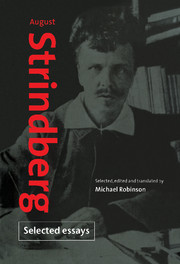Book contents
- Frontmatter
- Contents
- Notes on the text
- Introduction
- from Vivisections (1887)
- ‘On Modern Drama and Modern Theatre’ (1889)
- from Vivisections II (1894)
- ‘Césarine’ (1894)
- ‘Deranged Sensations’ (1894)
- ‘In the Cemetery’ (1896)
- from Jardin des Plantes (1896)
- ‘On the Action of Light in Photography’ (1896)
- ‘A Glance into Space’ (1896)
- ‘Edvard Munch's Exhibition’ (1896)
- ‘The Synthesis of Gold’ (1896)
- ‘Contemporary Gold-Making’ (1896)
- ‘The Sunflower’ (1896)
- ‘The Mysticism of World History’ (1903)
- ‘August Strindberg on Himself’ (1909)
- Notes and commentary
- Index
‘Césarine’ (1894)
On Alexandre Dumas fils’ drama La Femme de Claude
Published online by Cambridge University Press: 18 December 2009
- Frontmatter
- Contents
- Notes on the text
- Introduction
- from Vivisections (1887)
- ‘On Modern Drama and Modern Theatre’ (1889)
- from Vivisections II (1894)
- ‘Césarine’ (1894)
- ‘Deranged Sensations’ (1894)
- ‘In the Cemetery’ (1896)
- from Jardin des Plantes (1896)
- ‘On the Action of Light in Photography’ (1896)
- ‘A Glance into Space’ (1896)
- ‘Edvard Munch's Exhibition’ (1896)
- ‘The Synthesis of Gold’ (1896)
- ‘Contemporary Gold-Making’ (1896)
- ‘The Sunflower’ (1896)
- ‘The Mysticism of World History’ (1903)
- ‘August Strindberg on Himself’ (1909)
- Notes and commentary
- Index
Summary
No feeling compares in intensity with that of the dramatic author at work. He creates people, sometimes from nothing, sometimes from a lump of clay; he controls their fates according to his whims; he punishes and rewards; he rules over life and death in bringing his world to a happy or unhappy end. And people take his creations as if they were real, love or detest them, at the very least discuss them and criticise the creator just as they judge the great unknown, each after his own heart.
With what right do people take the liberty of saying to the author, ‘You should have done this or that’? Is he not the master of his little world? Certainly! But we are polytheists, we others, demigods, and there are always Olympians, who seek to overthrow the titans, or what amounts to the same thing, to educate them. Therefore, and since I have been asked to give my views on M. Dumas's play, here is my opinion.
M. Dumas seems to have done himself an injustice with the preface to his admirable drama. The artist works unconsciously, creates like nature, at random, with an astounding profligacy, but the moment he, post festum, tries to think his work over, to analyse it, he awakens from his half slumber, and falls to the ground like a sleepwalker.
Consider Césarine in this play. What a character, at once various, complex, sympathetic and abominable, a complete woman! In the preface the writer pares her down, reduces her to a paragraph in the penal code, imputes intentions to her that she does not have in the play.
- Type
- Chapter
- Information
- August Strindberg: Selected Essays , pp. 118 - 121Publisher: Cambridge University PressPrint publication year: 1996



